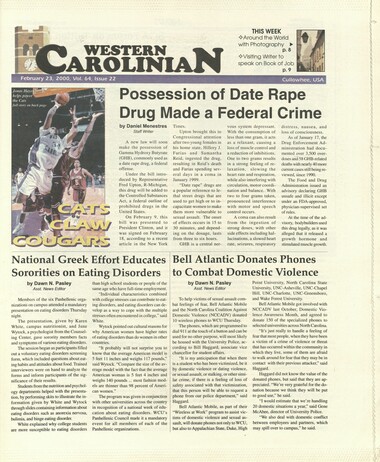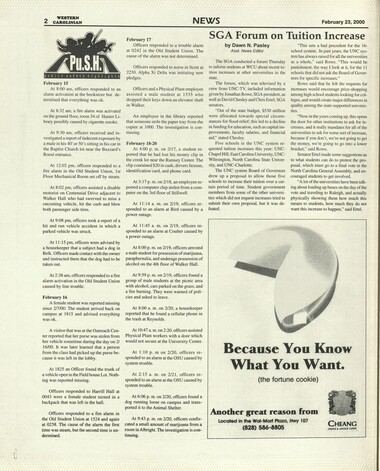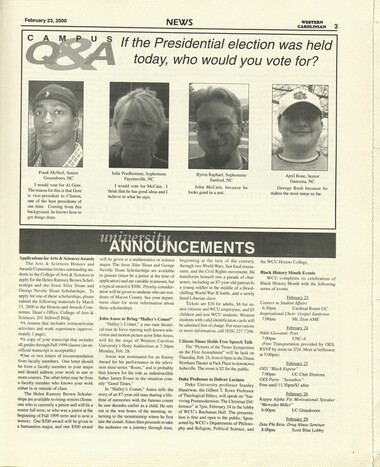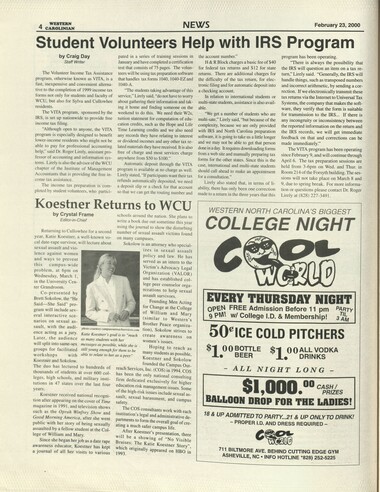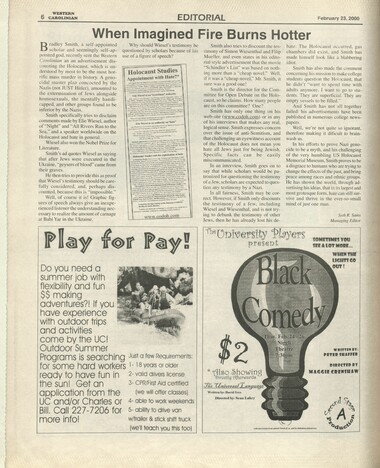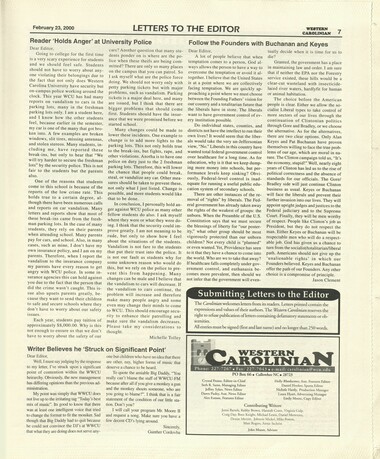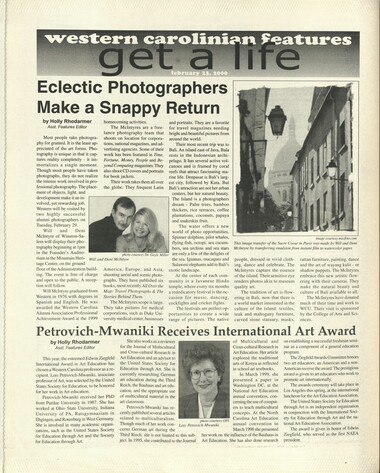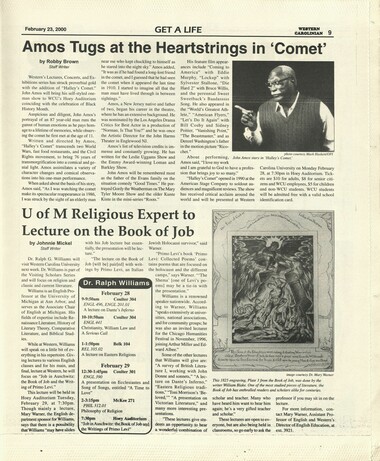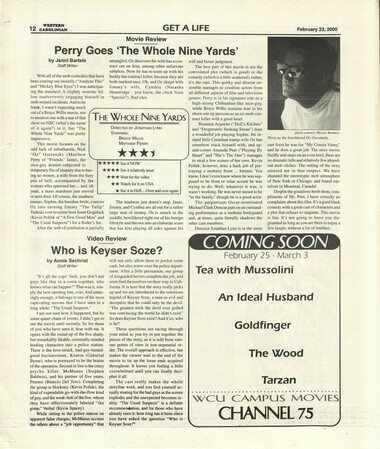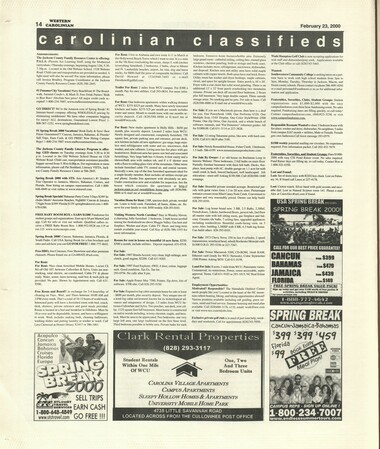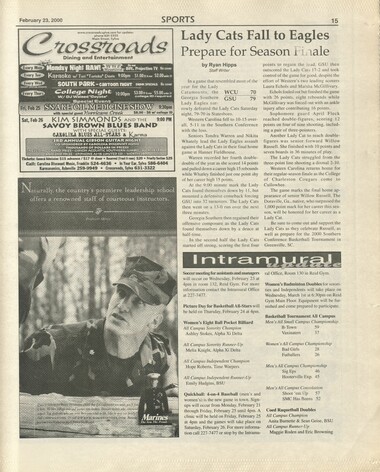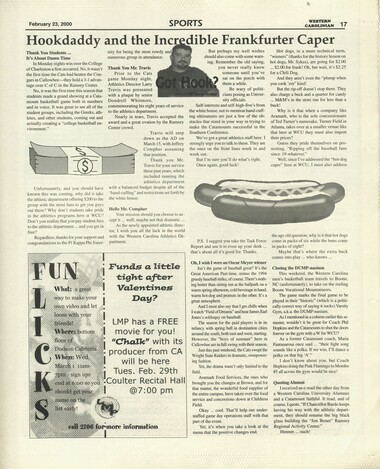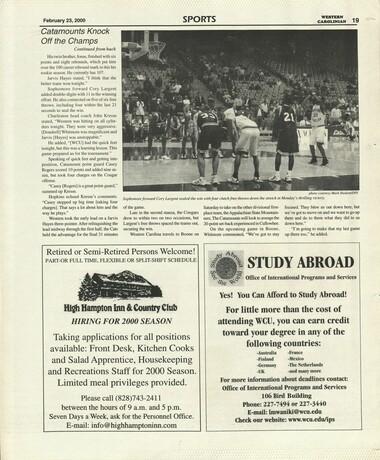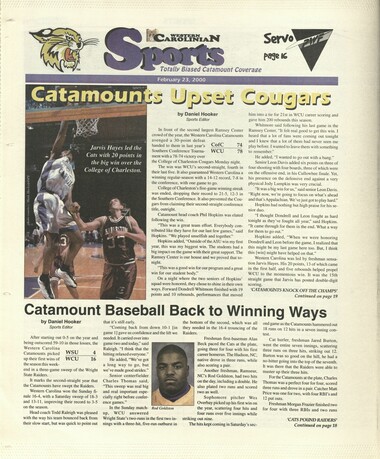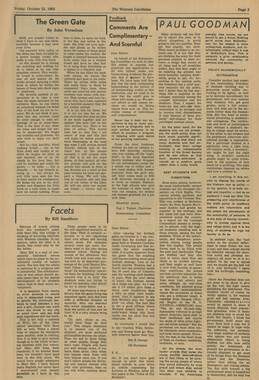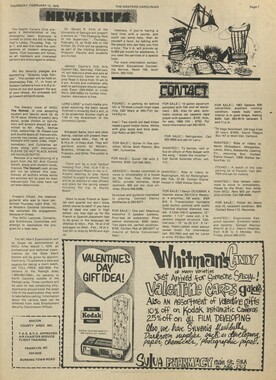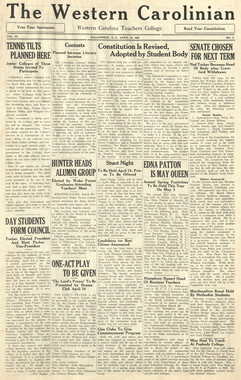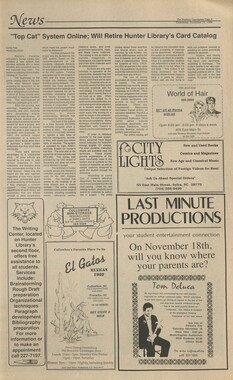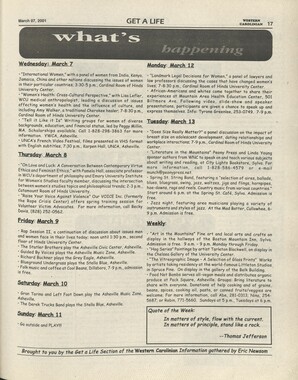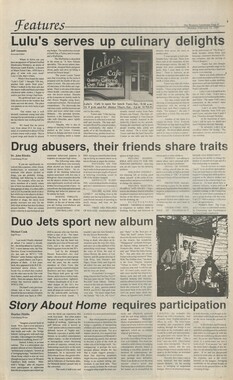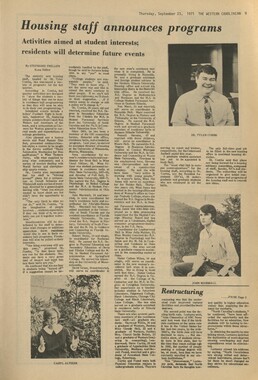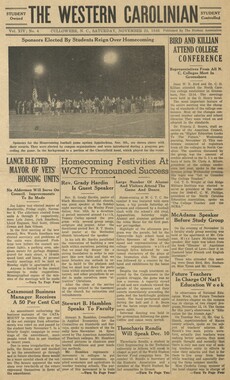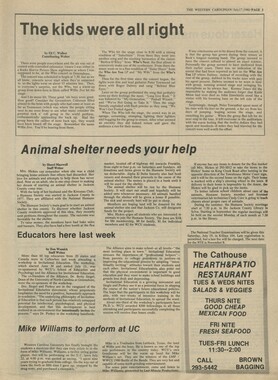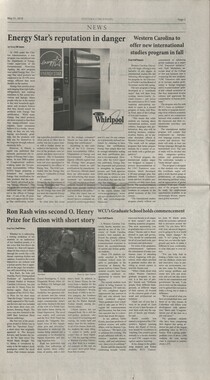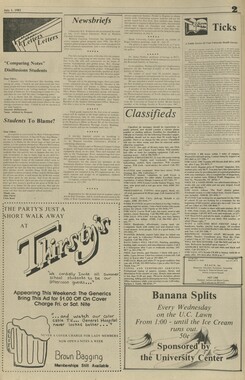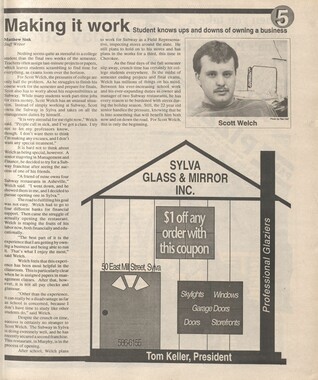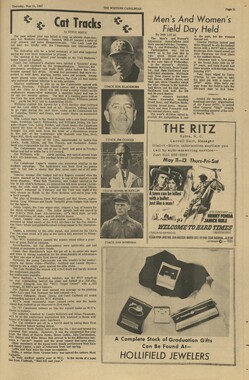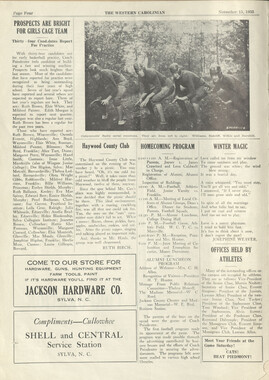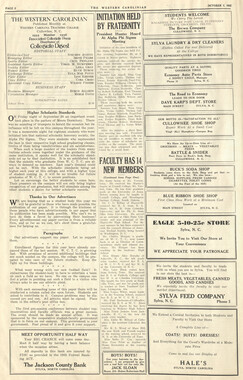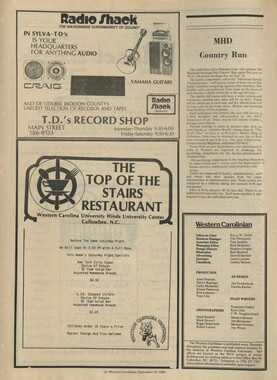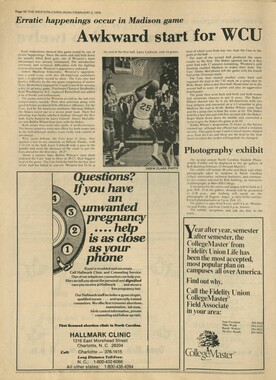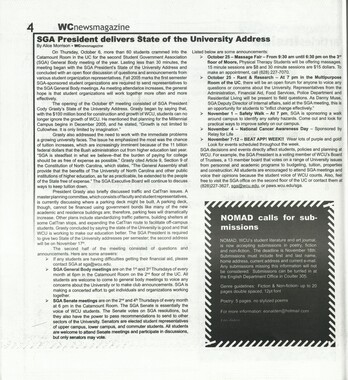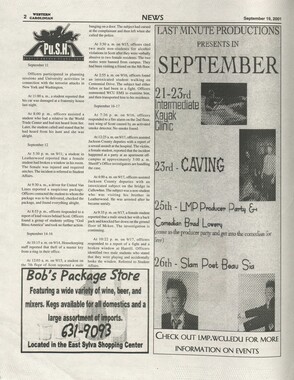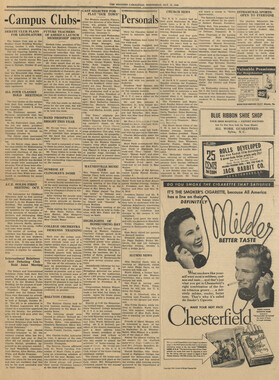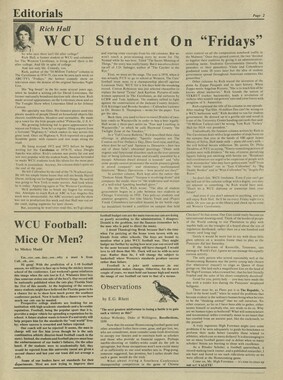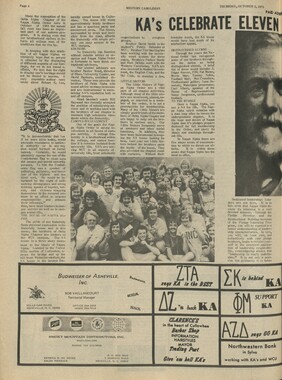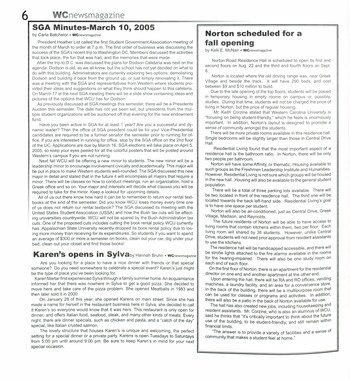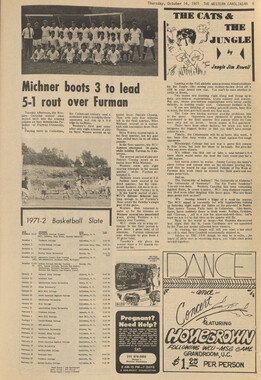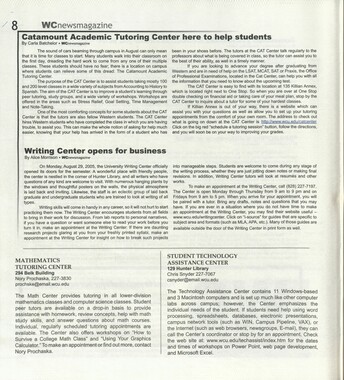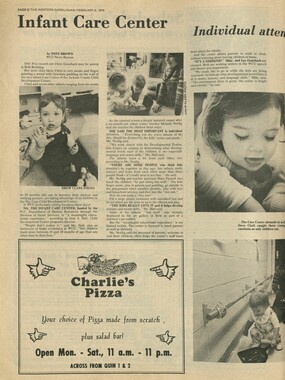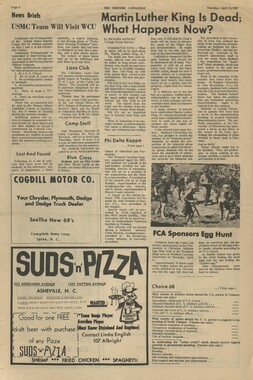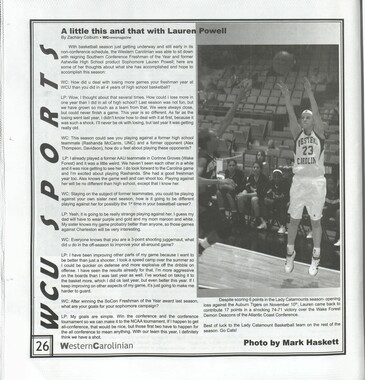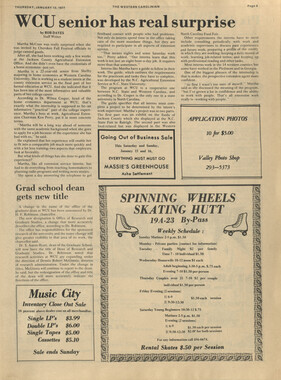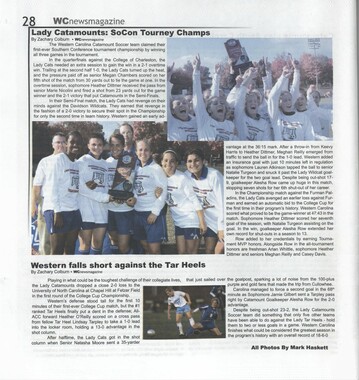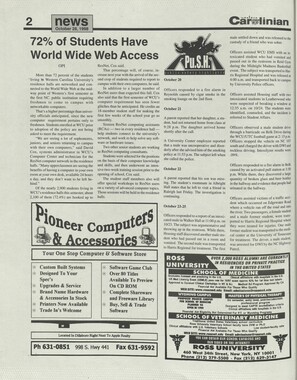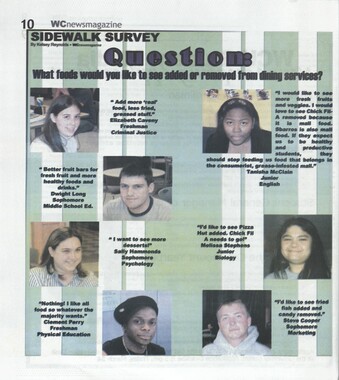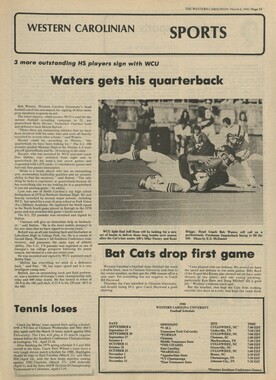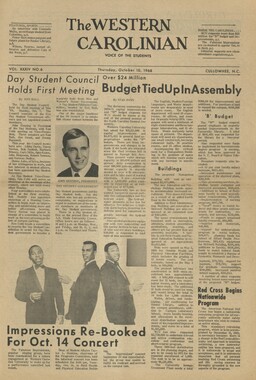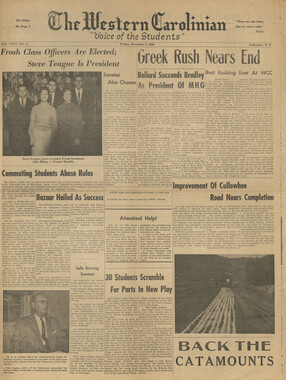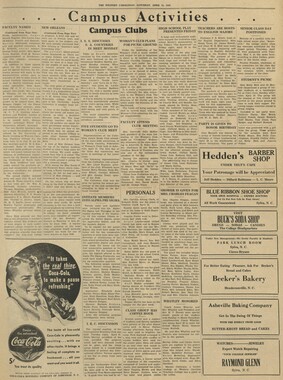Western Carolina University (21)
View all
- Canton Champion Fibre Company (2308)
- Cherokee Traditions (291)
- Civil War in Southern Appalachia (165)
- Craft Revival (1942)
- George Masa Collection (137)
- Great Smoky Mountains - A Park for America (3080)
- Highlights from Western Carolina University (422)
- Horace Kephart (973)
- Journeys Through Jackson (159)
- LGBTQIA+ Archive of Jackson County (89)
- Oral Histories of Western North Carolina (318)
- Picturing Appalachia (6617)
- Stories of Mountain Folk (413)
- Travel Western North Carolina (153)
- Western Carolina University Fine Art Museum Vitreograph Collection (129)
- Western Carolina University Herbarium (92)
- Western Carolina University: Making Memories (738)
- Western Carolina University Publications (2491)
- Western Carolina University Restricted Electronic Theses and Dissertations (146)
- Western North Carolina Regional Maps (71)
- World War II in Southern Appalachia (131)
University of North Carolina Asheville (6)
View all
- Allanstand Cottage Industries (62)
- Appalachian National Park Association (53)
- Bennett, Kelly, 1890-1974 (1463)
- Berry, Walter (76)
- Brasstown Carvers (40)
- Carver, George Washington, 1864?-1943 (26)
- Cathey, Joseph, 1803-1874 (1)
- Champion Fibre Company (233)
- Champion Paper and Fibre Company (297)
- Cherokee Indian Fair Association (16)
- Cherokee Language Program (22)
- Crowe, Amanda (40)
- Edmonston, Thomas Benton, 1842-1907 (7)
- Ensley, A. L. (Abraham Lincoln), 1865-1948 (275)
- Fromer, Irving Rhodes, 1913-1994 (70)
- George Butz (BFS 1907) (46)
- Goodrich, Frances Louisa (120)
- Grant, George Alexander, 1891-1964 (96)
- Heard, Marian Gladys (60)
- Kephart, Calvin, 1883-1969 (15)
- Kephart, Horace, 1862-1931 (313)
- Kephart, Laura, 1862-1954 (67)
- Laney, Gideon Thomas, 1889-1976 (439)
- Masa, George, 1881-1933 (61)
- McElhinney, William Julian, 1896-1953 (44)
- Niggli, Josephina, 1910-1983 (10)
- North Carolina Park Commission (105)
- Osborne, Kezia Stradley (9)
- Owens, Samuel Robert, 1918-1995 (11)
- Penland Weavers and Potters (36)
- Roberts, Vivienne (15)
- Roth, Albert, 1890-1974 (142)
- Schenck, Carl Alwin, 1868-1955 (1)
- Sherrill's Photography Studio (2565)
- Southern Highland Handicraft Guild (127)
- Southern Highlanders, Inc. (71)
- Stalcup, Jesse Bryson (46)
- Stearns, I. K. (213)
- Thompson, James Edward, 1880-1976 (226)
- United States. Indian Arts and Crafts Board (130)
- USFS (683)
- Vance, Zebulon Baird, 1830-1894 (1)
- Weaver, Zebulon, 1872-1948 (58)
- Western Carolina College (230)
- Western Carolina Teachers College (282)
- Western Carolina University (2008)
- Western Carolina University. Mountain Heritage Center (18)
- Whitman, Walt, 1819-1892 (10)
- Wilburn, Hiram Coleman, 1880-1967 (73)
- Williams, Isadora (3)
- Cain, Doreyl Ammons (0)
- Crittenden, Lorraine (0)
- Rhodes, Judy (0)
- Smith, Edward Clark (0)
- Appalachian Region, Southern (3032)
- Asheville (N.C.) (1945)
- Avery County (N.C.) (26)
- Blount County (Tenn.) (195)
- Buncombe County (N.C.) (1680)
- Cherokee County (N.C.) (283)
- Clay County (N.C.) (556)
- Graham County (N.C.) (238)
- Great Smoky Mountains National Park (N.C. and Tenn.) (525)
- Haywood County (N.C.) (3573)
- Henderson County (N.C.) (70)
- Jackson County (N.C.) (4925)
- Knox County (Tenn.) (35)
- Knoxville (Tenn.) (13)
- Lake Santeetlah (N.C.) (10)
- Macon County (N.C.) (421)
- Madison County (N.C.) (216)
- McDowell County (N.C.) (39)
- Mitchell County (N.C.) (135)
- Polk County (N.C.) (35)
- Qualla Boundary (982)
- Rutherford County (N.C.) (78)
- Swain County (N.C.) (2185)
- Transylvania County (N.C.) (270)
- Watauga County (N.C.) (12)
- Waynesville (N.C.) (86)
- Yancey County (N.C.) (72)
- Aerial Photographs (3)
- Aerial Views (60)
- Albums (books) (4)
- Articles (1)
- Artifacts (object Genre) (228)
- Bibliographies (1)
- Biography (general Genre) (2)
- Cards (information Artifacts) (38)
- Clippings (information Artifacts) (192)
- Copybooks (instructional Materials) (3)
- Crafts (art Genres) (622)
- Depictions (visual Works) (21)
- Design Drawings (1)
- Digital Moving Image Formats (2)
- Drawings (visual Works) (185)
- Envelopes (101)
- Exhibitions (events) (1)
- Facsimiles (reproductions) (1)
- Fiction (general Genre) (4)
- Financial Records (12)
- Fliers (printed Matter) (67)
- Glass Plate Negatives (381)
- Guidebooks (2)
- Internegatives (10)
- Interviews (823)
- Land Surveys (102)
- Letters (correspondence) (1045)
- Manuscripts (documents) (618)
- Maps (documents) (177)
- Memorandums (25)
- Minutes (administrative Records) (59)
- Negatives (photographs) (6090)
- Newsletters (1290)
- Newspapers (2)
- Notebooks (8)
- Occupation Currency (1)
- Paintings (visual Works) (1)
- Pen And Ink Drawings (1)
- Periodicals (194)
- Personal Narratives (10)
- Photographs (12977)
- Plans (maps) (1)
- Poetry (6)
- Portraits (4568)
- Postcards (329)
- Programs (documents) (181)
- Publications (documents) (2444)
- Questionnaires (65)
- Relief Prints (26)
- Sayings (literary Genre) (1)
- Scrapbooks (282)
- Sheet Music (2)
- Slides (photographs) (402)
- Songs (musical Compositions) (2)
- Sound Recordings (802)
- Specimens (92)
- Speeches (documents) (18)
- Tintypes (photographs) (8)
- Transcripts (329)
- Text Messages (0)
- A.L. Ensley Collection (275)
- Appalachian Industrial School Records (7)
- Appalachian National Park Association Records (336)
- Axley-Meroney Collection (2)
- Bayard Wootten Photograph Collection (20)
- Bethel Rural Community Organization Collection (7)
- Blumer Collection (5)
- C.W. Slagle Collection (20)
- Canton Area Historical Museum (2110)
- Carlos C. Campbell Collection (462)
- Cataloochee History Project (64)
- Cherokee Studies Collection (4)
- Daisy Dame Photograph Album (5)
- Daniel Boone VI Collection (1)
- Doris Ulmann Photograph Collection (112)
- Elizabeth H. Lasley Collection (1)
- Elizabeth Woolworth Szold Fleharty Collection (4)
- Frank Fry Collection (95)
- George Masa Collection (173)
- Gideon Laney Collection (452)
- Hazel Scarborough Collection (2)
- Hiram C. Wilburn Papers (28)
- Historic Photographs Collection (236)
- Horace Kephart Collection (861)
- Humbard Collection (33)
- Hunter and Weaver Families Collection (1)
- I. D. Blumenthal Collection (4)
- Isadora Williams Collection (4)
- Jesse Bryson Stalcup Collection (47)
- Jim Thompson Collection (224)
- John B. Battle Collection (7)
- John C. Campbell Folk School Records (80)
- John Parris Collection (6)
- Judaculla Rock project (2)
- Kelly Bennett Collection (1482)
- Love Family Papers (11)
- Major Wiley Parris Civil War Letters (3)
- Map Collection (12)
- McFee-Misemer Civil War Letters (34)
- Mountain Heritage Center Collection (4)
- Norburn - Robertson - Thomson Families Collection (44)
- Pauline Hood Collection (7)
- Pre-Guild Collection (2)
- Qualla Arts and Crafts Mutual Collection (12)
- R.A. Romanes Collection (681)
- Rosser H. Taylor Collection (1)
- Samuel Robert Owens Collection (94)
- Sara Madison Collection (144)
- Sherrill Studio Photo Collection (2558)
- Smoky Mountains Hiking Club Collection (616)
- Stories of Mountain Folk - Radio Programs (374)
- The Reporter, Western Carolina University (510)
- Venoy and Elizabeth Reed Collection (16)
- WCU Gender and Sexuality Oral History Project (36)
- WCU Mountain Heritage Center Oral Histories (25)
- WCU Oral History Collection - Mountain People, Mountain Lives (71)
- WCU Students Newspapers Collection (1923)
- Western North Carolina Tomorrow Black Oral History Project (69)
- William Williams Stringfield Collection (2)
- Zebulon Weaver Collection (109)
- African Americans (390)
- Appalachian Trail (35)
- Artisans (521)
- Cherokee art (84)
- Cherokee artists -- North Carolina (10)
- Cherokee language (21)
- Cherokee pottery (101)
- Cherokee women (208)
- Church buildings (190)
- Civilian Conservation Corps (U.S.) (111)
- College student newspapers and periodicals (2012)
- Dams (108)
- Dance (1023)
- Education (222)
- Floods (63)
- Folk music (1015)
- Forced removal, 1813-1903 (2)
- Forest conservation (220)
- Forests and forestry (1198)
- Gender nonconformity (4)
- Great Smoky Mountains National Park (N.C. and Tenn.) (181)
- Hunting (47)
- Landscape photography (25)
- Logging (122)
- Maps (83)
- Mines and mineral resources (9)
- North Carolina -- Maps (18)
- Paper industry (38)
- Postcards (255)
- Pottery (135)
- Railroad trains (72)
- Rural electrification -- North Carolina, Western (3)
- School integration -- Southern States (2)
- Segregation -- North Carolina, Western (5)
- Slavery (5)
- Sports (452)
- Storytelling (243)
- Waterfalls -- Great Smoky Mountains (N.C. and Tenn.) (66)
- Weaving -- Appalachian Region, Southern (280)
- Wood-carving -- Appalachian Region, Southern (328)
- World War, 1939-1945 (173)
Western Carolinian Volume 64 (65) Number 22
Item
Item’s are ‘child’ level descriptions to ‘parent’ objects, (e.g. one page of a whole book).
-
-
WESTERN aroliniaN THIS WEEK ^Around the World with Photography ► P-8 ^Visiting Writer to speak on Book of Job P. 9 February 23, 2000, Vol. 64, Issue 22 Cullowhee, USA Possession of Date Rape Drug Made a Federal Crime by Daniel Menestres Staff Writer A new law will soon make the possession of Gamma Hydroxy Butyrate (GHB), commonly used as a date rape drug, a federal offense. Under the bill introduced by Representative Fred Upton, R-Michigan, this drug will be added to the Controlled Substances Act, a federal outline of prohibited drugs in the United States. On February 9, this bill was presented to President Clinton, and it was signed on February 18, according to a recent article in the New York Times. Upton brought this to Congressional attention after two young females in his home state, Hillory J. Farias and Samantha Reid, ingested the drug, resulting in Reid's death and Farias spending several days in a coma in January 1999. "Date rape" drugs are a popular reference to lethal street drugs that are used to get high or to incapacitate women to make them more vulnerable to sexual assault. The onset of effects occurs in 15 to 30 minutes, and depending on the dosage, lasts from three to six hours. GHB is a central ner vous system depressant. With the consumption of less than one gram, it acts as a relaxant, causing a loss of muscle control and a reduction of inhibitions. One to two grams results in a strong feeling of relaxation, slowing the heart rate and respiration, while also interfering with circulation, motor coordination and balance. With two to four grams taken, pronounced interference with motor and speech control occurs. A coma can also result from the ingestion of strong doses, with other side effects including hallucinations, a slowed heart rate, seizures, respiratory distress, nausea, and loss of consciousness. As of January 17, the Drug Enforcement Administration had documented over 3,500 overdoses and 58 GHB-related deaths with nearly 40 more current cases still being reviewed, since 1990. The Food and Drug Administration issued an advisory declaring GHB unsafe and illicit except under an FDA-approved, physician-supervised set of rules. At the time of the advisory, bodybuilders used this drug legally, as it was alleged that it released a growth hormone and stimulated muscle growth. National Greek Effort Educates Sororities on Eating Disorders by Dawn N. Pasley Asst. News Editor Members of the six Panhellenic organizations on campus attended a mandatory presentation on eating disorders Thursday night. The presentation, given by Karen White, campus nutritionist, and June Wytock, a psychologist from the Counseling Center, gave sorority members facts and symptoms of various eating disorders. The session began as participants filled out a voluntary eating disorders screening form, which included questions about eating habits and attitudes about food. Trained interviewers were on hand to analyze the forms and inform participants of the significance of their results. Students from the nutrition and psychology departments helped with the presentation, by performing skits to illustrate the information given by White and Wytock through slides containing information about eating disorders such as anorexia nervosa, bulimia, and binge eating disorder. White explained why college students are more susceptible to eating disorders than high school students or people of the same age who have full-time employment. "Individual characteristics combined with college stresses can contribute to eating disorders, and eating disorders can develop as a way to cope with the multiple stresses often encountered in college," said White. Wytock pointed out cultural reasons for why American women have higher rates of eating disorders than do women in other countries. "It probably will not surprise you to know that the average American model is 5 feet 11 inches and weighs 117 pounds," said Wytock. "Compare the size of the average model with the fact that the average American woman is 5 feet 4 inches and weighs 140 pounds ... most fashion models are thinner than 98 percent of American women." The program was given in conjunction with other universities across the country in recognition of a national week of education about eating disorders. WCU's Panhellenic Council made it a mandatory event for all members of each of the Panhellenic organizations. Bell Atlantic Donates Phones to Combat Domestic Violence by Dawn N. Pasley Asst. News Editor To help victims of sexual assault combat feelings of fear, Bell Atlantic Mobile and the North Carolina Coalition Against Domestic Violence (NCCADV) donated 10 wireless phones to WCU Thursday. The phones, which are programmed to dial 911 at the touch of a button and can be used for no other purpose, will most likely be housed with the University Police, according to Bill Haggard, associate vice chancellor for student affairs. "It is my anticipation that when there is a student who has been victimized, be it by domestic violence or dating violence, or sexual assault, or stalking, or other similar crime, if there is a feeling of loss of safety associated with that victimization, that this person will be able to request a phone from our police department," said Haggard. Bell Atlantic Mobile, as part of their "Wireless at Work" program to assist victims of domestic violence and sexual assault, will donate phones not only to WCU, but also to Appalachian State, Duke, High Point University, North Carolina State University, UNC-Asheville, UNC-Chapel Hill, UNC-Charlotte, UNC-Greensboro, and Wake Forest University. Bell Atlantic Mobile got involved with NCCADV last October, Domestic Violence Awareness Month, and agreed to donate 150 of the specialized phones to selected universities across North Carolina. "It's just really to handle a feeling of fear that most people, when they have been a victim of a crime of violence or threat that has occurred within the community in which they live, some of them are afraid to walk around for fear that they may be in contact with their previous attacker," said Haggard. Haggard did not know the value of the donated phones, but said that they are appreciated. "We're very grateful for the donation because we think they will be put to good use," he said. "I would estimate that we're handling 20 domestic situations a year," said Gene McAbee, director of University Police. "We also deal with domestic conflict between employees and partners, which may spill over to campus," he said. ,
Object
Object’s are ‘parent’ level descriptions to ‘children’ items, (e.g. a book with pages).
-
The Western Carolinian is Western Carolina University's student-run newspaper. The paper was published as the Cullowhee Yodel from 1924 to 1931 before changing its name to The Western Carolinian in 1933.
-
